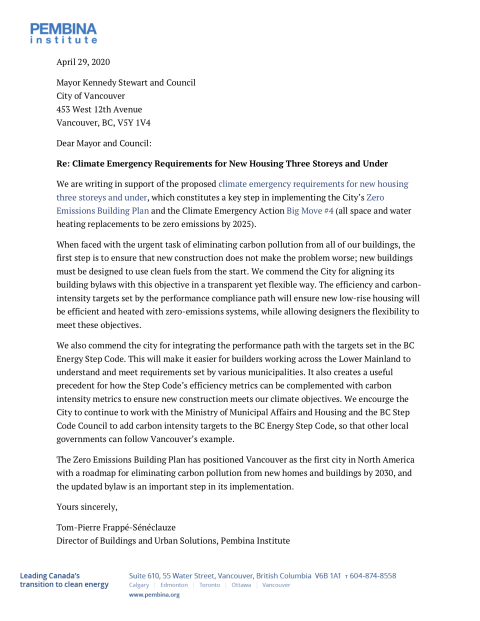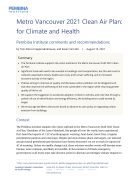The Pembina Institute sent the following letter to Vancouver mayor Kennedy Stewart and city council:
April 29, 2020
Mayor Kennedy Stewart and Council
City of Vancouver
453 West 12th Avenue
Vancouver, BC, V5Y 1V4
Dear Mayor and Council:
Re: Climate Emergency Requirements for New Housing Three Storeys and Under
We are writing in support of the proposed climate emergency requirements for new housing three storeys and under, which constitutes a key step in implementing the City’s Zero Emissions Building Plan and the Climate Emergency Action Big Move #4 (all space and water heating replacements to be zero emissions by 2025).
When faced with the urgent task of eliminating carbon pollution from all of our buildings, the first step is to ensure that new construction does not make the problem worse; new buildings must be designed to use clean fuels from the start. We commend the City for aligning its building bylaws with this objective in a transparent yet flexible way. The efficiency and carbon-intensity targets set by the performance compliance path will ensure new low-rise housing will be efficient and heated with zero-emissions systems, while allowing designers the flexibility to meet these objectives.
We also commend the city for integrating the performance path with the targets set in the BC Energy Step Code. This will make it easier for builders working across the Lower Mainland to understand and meet requirements set by various municipalities. It also creates a useful precedent for how the Step Code’s efficiency metrics can be complemented with carbon intensity metrics to ensure new construction meets our climate objectives. We encourge the City to continue to work with the Ministry of Municipal Affairs and Housing and the BC Step Code Council to add carbon intensity targets to the BC Energy Step Code, so that other local governments can follow Vancouver’s example.
The Zero Emissions Building Plan has positioned Vancouver as the first city in North America with a roadmap for eliminating carbon pollution from new homes and buildings by 2030, and the updated bylaw is an important step in its implementation.
Yours sincerely,
Tom-Pierre Frappé-Sénéclauze
Director of Buildings and Urban Solutions, Pembina Institute






